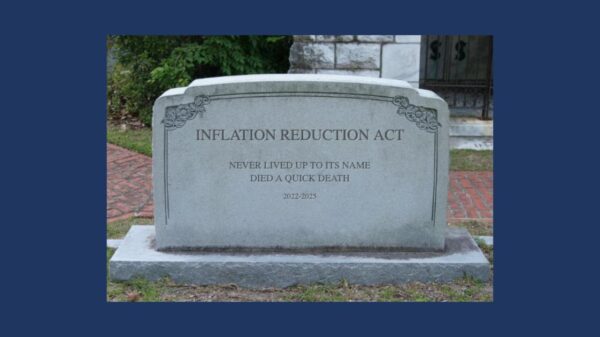“You can smile,” President Biden assured Speaker of the House Kevin McCarthy.
“It’s okay,” Biden added, handing the Republican a leader a hard copy of his speech. An unamused McCarthy, instead, sat stone-faced for much of the night.
With a laugh and his own smile, Biden was trying to call McCarthy’s bluff. The back-bench Republicans, who shouted at the president throughout Tuesday night’s State of the Union address, in turn, may have showed the new speaker’s cards.
Biden knew what he was doing. “Speaker, I don’t want to ruin your reputation,” he said moments later, “but I look forward to working with you.” The president was hinting at the defining characteristic of the current moment in divided government: McCarthy holds a precarious grip on the speaker’s gavel. His right flank has little interest in compromise with the White House, and under the negotiated rules that McCarthy accepted to become speaker, a single frustrated conservative can call a vote on his removal.
In a moment that was quickly overlooked, Minority Leader Mitch McConnell, an old Senate colleague of Biden’s, also got a shoutout from the president for being “the longest serving leader in history.”
It was the first time Biden addressed the new Republican majority. A stalemate underscored the evening. The White House refuses to negotiate on the debt ceiling, a message Biden delivered again in person. Pressed by hardliners on his right flank, McCarthy has demanded negotiations and sees the issue as a leverage point.
Exasperation was apparent. When the president claimed that some Republicans wanted to sunset Medicare and Social Security, the right side of the chamber booed so loudly that the House sounded like the more raucous British Parliament than the usually more reserved United States Congress. “I’ll give you a copy of the proposal,” Biden replied referring to a plan by Florida Sen. Rick Scott that would do exactly what he just described, despite the fact that McConnell and McCarthy have repeatedly rejected it and pledged that cuts to those entitlements are off the table.
Impatient for the official Republican rebuttal later that night, Republican Rep. Marjorie Taylor Greene shouted, “You lie!” at Biden and “Liar!” And the Georgia firebrand, who was spotted with a big white balloon earlier in the day, yelled again, this time when Biden was discussing China. “China is spying on us,” she shouted.
Over the president’s shoulder, McCarthy could be seen shaking his head and appeared to shush the interrupting member.
When Biden continued, he made only passing reference to the Chinese spy balloon that floated across the continent for a week before a U.S. F-22 fighter jet finally downed it in the Atlantic Ocean. The episode was evidence, Biden said before quickly moving on, that “if China threatens our sovereignty, we will act to protect our country.” The balloon had overshadowed good news that the White House wanted to tout last week: the creation of more than half a million jobs in January. The president took a second bite at the apple Tuesday, reminding the opposition party that doubted him that unemployment was at “a 50-year low.”
Biden also declared that “we have broken COVID’s grip on us,” plugged his infrastructure spending law, and encouraged continued bipartisan support for Ukraine. He spent more time, however, discussing the “junk fees” credit card companies attach to monthly bills, “baggage fees” charged by airlines, and “resort fees that hotels tack on to your bill” than either the threat from China or the continued chaos on U.S. southern border.
Arkansas Gov. Sarah Huckabee Sanders later slammed Biden for refusing “to stand up to China” and showing himself “unwilling to defend our border, defend our skies and defend our people.” In measured tones during the Republican rebuttal, the former Trump White House press secretary concluded that Biden was “simply unfit to serve as commander in chief.”
Republicans are focused on slowing Biden’s agenda to a crawl. The White House has maneuvered in response by trying to drive a wedge between the new speaker and the conservative House Freedom Caucus. Biden offered unwelcome sympathy last week when he said that McCarthy made commitments that are just absolutely off the wall” earlier in the year to win over his hard-right skeptics. And in recent days, his administration has assailed those members by name.
The attacks haven’t broken through. If anything, after the classified documents scandal and the spy balloon fiasco, Republicans seem united. At least for now, members of the House Freedom Caucus even seem invested in McCarthy’s success as speaker, especially during negotiations over the debt ceiling.
Republicans enjoyed a collective laugh at Biden’s expense when he said oil and gas would be needed “for at least another decade” after alleging fossil fuel executives were fleecing the American public.
There were olive branches, like when the president told his “Republican friends” that “if we could work together in the last Congress, there’s no reason we can’t work together and find consensus on important things in this Congress as well.” There were also thorns that the GOP won’t suffer now that they control the House, like Biden’s call to pass “my proposal for the billionaire minimum tax.”
That tax will not pass the House. Neither will a number of the president’s stated priorities, but Tuesday’s address sounded more like a stump speech for a second term, even as many in his own party hope he won’t run again. In the moment, the president clearly hit the fault lines between conservatives and GOP brass that he could exploit to soften up the opposition. He also previewed a line that could work as a campaign slogan in a pinch. A dozen times, Biden said it was time “to finish the job.”
McCarthy was happy to let Sanders have the last word. The Arkansas governor, he tweeted, “just knocked it out the park.” Her rebuttal was apt, he added, because “Republicans offer a vision for a future built on freedom, not fear-mongering.”
The fight over the debt ceiling, meanwhile, is ongoing. Biden may soon rely on the other Republican leader, the one he began the night by heralding. When then-Speaker John Boehner couldn’t wrangle unruly fiscal conservatives in the House during debt ceiling negotiations in 2012, then-Vice President Biden phoned Mitch McConnell at the last minute on New Year’s Eve. They struck a deal.
“It’s not so much a buddy thing,” a senior Republican aide told the Washington Post at the time. “The two of them can do business, they can find solutions together.”
This article was originally published by RealClearPolitics and made available via RealClearWire.



















